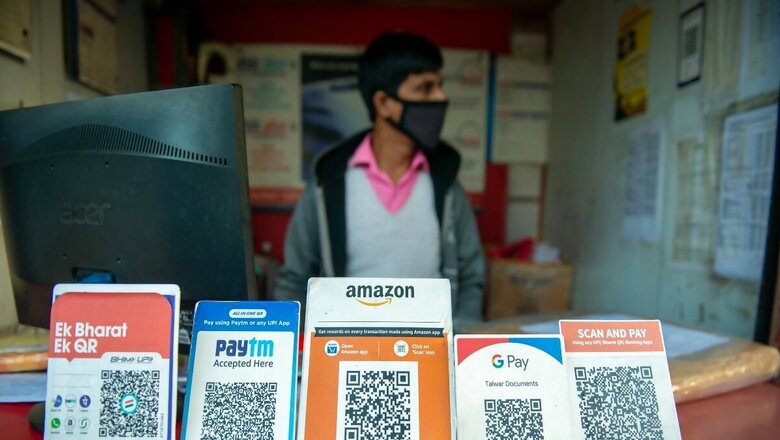
views
The deployment of population-scale digital public infrastructure (DPI) is gaining traction worldwide. It is widely acknowledged as a necessary and cost-effective intervention to fast-track sustainable development goals (SDGs). As the current chair of the G20, India has an opportunity to showcase and advocate for the global adoption of its world-class DPI and help create a common digital future. The Indian government must also leverage bilateral ties with partner countries and multilateral channels such as the International Monetary Fund (IMF) and the World Bank to push for greater adoption of its DPI globally.
DPI refers to digital solutions and systems which enable the provision of vital services between government, businesses and citizens. These include identification, payment, and data exchange systems. DPI has fast-tracked financial inclusion and enabled the efficient and effective delivery of government services.
India has successfully developed and deployed digital public infrastructure at a population scale for various purposes. The Bank of International Settlements has recognised India’s use of DPIs to accelerate financial inclusion outcomes by four decades. India’s Unified Payments Interface (UPI) is now the world’s largest fast-payment network and still clocks 50 percent YoY growth. Additionally, Aadhaar has enabled seamless verification of individuals and streamlined access to government services and benefits. India’s vaccine distribution and management platform, CoWIN, has allowed for the rapid scaling up of vaccine delivery efforts.
Benefits of Globalising India’s DPI
Different countries may have differing requirements for how DPI needs to be implemented. This includes customising it for their governance needs and local language support. System integrators play a vital role in building and customising such solutions. Concerns over sovereignty might also dictate that local teams must be trained to operate and maintain the systems. These present excellent opportunities to open new markets for Indian firms that build and integrate DPI.
Imagine the convenience of travelling to a foreign country without the hassle of carrying foreign currency or paying exorbitant forex markups. Singapore’s PayNow has been integrated with UPI to create a cross-border real-time payments system. Such integration with the United Arab Emirates (UAE) and other countries is also on the cards. Compatible DPI implemented across countries can enable seamless integration, reducing transaction costs.
India’s software exports have helped to project the nation as a hub for high-quality software development and engineering services, contributing to its soft power. Empowering other countries with the tools that have helped India leapfrog some of the development goals could help further enhance this perception.
Lastly, wider adoption of India’s DPI could lead to global standards, best practices, and innovation trickling back to India. Whether related to regulatory frameworks for data protection, governance structures for increasing competition and transparency, or multiple language support, lessons can be learnt from taking India’s DPI to other countries.
Pathways to Globalising India’s DPI
Developing countries have significant benefits to be gained from the adoption of DPI. The potential to leapfrog development goals by reducing leakages, curbing corruption and increasing financial inclusion is far greater for low and middle-income countries (LMICs). As the current chair of the G20, India has an opportunity to showcase and advocate for the global adoption of its DPI. The Indian government should work with like-minded partners to promote and deploy DPI through the support programs of multilateral lending institutions like the IMF and the World Bank.
Open-sourcing its DPI is another effective way of making DPI more easily accessible to other countries. MOSIP (Modular Open-Source Identity Platform), developed by IIIT Bangalore, is an open-source identity platform like Aadhaar. Ethiopia, the Philippines, Guinea, and others have adopted this. Other examples of open-source DPI include X Road, a data exchange platform developed by Estonia and Mojaloop, a payments platform developed by an international consortium. Open source also avoids technology or vendor lock-in addressing sovereignty concerns over DPI.
India should also work with countries that share values, interests and complementarity to enable the adoption of DPI in friendly countries. For instance, Australia and India could collaborate to support Pacific Island States in adopting DPI. Similarly, the US and India could collaborate to deploy DPI in low-income countries globally. This support should extend to providing financial and technical assistance for building DPI and the enabling infrastructure needed for its functioning.
It’s worth noting that the benefits of DPI are not restricted to low and middle-income countries alone. DPI can offer an opportunity for all countries to digitise their economies and societies. The integration of cross-border real-time payment systems across countries is one of the most promising outcomes of DPI adoption. Therefore, it’s essential for all countries, regardless of income level, to consider the potential benefits of DPI adoption and explore ways to implement it in their economies and societies.
A robust DPI widely adopted across the globe presents opportunities for both innovation and economic growth while fostering inclusivity. To achieve this goal of a common digital future, the Indian government must take a leading role in the global dissemination of its digital public infrastructure.
Bharath Reddy and Saurabh Todi are researchers at the Takshashila Institution, an independent and non-partisan think tank and school of public policy. Views expressed are personal and do not represent the stand of this publication.




















Comments
0 comment